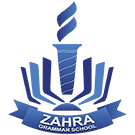
Zahra Grammar follows the guidelines set out by NESA, from Kindergarten to Year 4. Zahra Grammar actively promotes student centered inquiry based learning and incorporates the Blooms Taxonomy in all KLA’s to promote understanding and reflection of what is learnt in class.
Key Learning Areas
Mathematics
-
- Students develop skills in Number, Space, Measurement and working Mathematically
English
-
- Students are involved in Talking, Listening, Reading, Phonics/Spelling, Writing, Grammar, Handwriting
Arabic
-
- Students are involved in Talking, Listening, Reading, Writing, Grammar, Arabic Rhymes and Poetry
Creative Arts
-
- Students are involved in the study of Visual Arts, Drama, Rhythm, Rhyme, Tone and Pitch
Science and Technology
-
- Students are involved in Designing and Making, Learning about Technologies, Communication, the Earth and its Surroundings, Living Things, etc.
History and Geography
-
- Students learn about Change and Continuity, Cultures, Environments, Social Systems and their Structures
Personal Development (PDHPE)
-
- Here the focus is on Safe Living, Healthy Choices, Active Lifestyles, Interpersonal Relationships, Growth and Development, Games and Sport
Islamic Studies
-
- Students focus on Talking, Listening Reading Surah’s, Fiqh, A-Hadith, Procedures of Salah, Dhikr (ways to remember Allah)
At Zahra Grammar we continuously evaluate and asses the students. Parents are encouraged to consult and meet with teachers on a regular basis. If you need to meet with your child’s teacher, please contact the school office to make an appointment.
Homework
Homework is an integral part of a student’s Educational Development. Parents can give valued assistance by seeing that each individual student completes their homework. Please make sure that you sign and date all homework when it has been completed.
What is homework?
- Practicing work learned during school hours
- Revising certain concepts
- Completing a project or assignment
- Reading
- Studying for an exam
- Completing class tasks
- Watching news, science programs or educational documentaries
